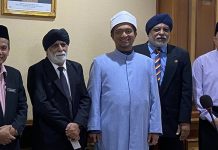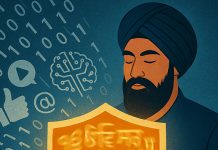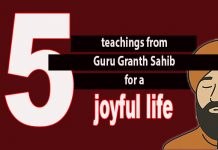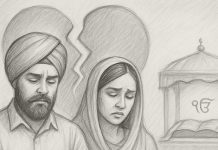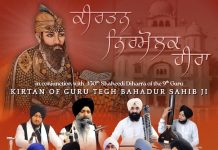
By Gurnam Singh | Opinion |
The celebrated Cambridge professor Bertrand Russell (1872–1970) was one of the 20th century’s most influential philosophers, renowned for his work in logic, mathematics, political thought and social criticism. His philosophy was founded on a deep commitment to reason, evidence and critical inquiry.
This devotion to reason led him to reject classical theism and the idea of an all-loving, all-knowing and all-powerful God, resulting in his becoming an outspoken atheist. In his landmark essay, Why I Am Not a Christian (1957), Russell articulated his rejection of religious dogma, arguing that belief in God couldn’t be rationally sustained and that organised religion often served as a source of fear and cruelty.
However, unlike some modern atheists, such as Richard Dawkins, Christopher Hitchens and Sam Harris, Russell was not openly hostile toward the religious. His humanism was rooted in compassion and intellectual honesty, a desire to replace blind faith with reason and cruelty with kindness.
When compared to the Sikh worldview, Russell’s philosophy offers both striking parallels and critical contrasts. This piece explores a comparison of their critiques of religion and belief, presented as an imaginary dialogue. The dialogue’s format combines the Socratic method with Guru Nanak’s approach of gian goshti, or discourses on divine wisdom.
Setting
The dialogue takes place in a lush forest on the banks of a flowing river. Bertrand Russell, the sceptical philosopher, sits with a notebook in hand. Guru Nanak, accompanied by his life-long companion, Bhai Mardana, calm and radiant, softly sings a line of Gurbani from his Pothi Sahib containing a collection of his Shabads before turning his attention to Prof Russell. The dialogue commences with Russell stating the case for his refusal to accept the existence of God and Gods.
On God and Projection
Russell: “I’ve studied many religions and found them to be reflections of human wishes, desires, fantacies and fears. As I once wrote, “Cruel men believe in a cruel god and use their belief to excuse their cruelty. Only kindly men believe in a kindly god, and they would be kindly in any case.” This convinces me that gods are mirrors of human psychology. Why, then, should I believe in your God?”
Guru Nanak: “What you have seen are indeed human projections. People fashion gods in their own image, as angry, jealous and punitive. But these are false idols. The Divine I speak of is not made by man’s imagination. It is formless (nirankar), timeless and all-pervading force. It is not an emperor with a long flowing beard and white robes in the sky, but the essence of universal love, truth and justice.”
Russell: “But to me, such language is just metaphoric and has no meaning in the physical world of things and objects. To speak of ‘essence’ and ‘formless reality’ is poetic, but it doesn’t prove existence. I find no need for God to explain the physical world; science does a much better job.”
Guru Nanak: “Though very important in their own right, proof lies not in reasoned argument or science alone but in experience. Knowledge and knowing are not the same thing. Just as you can’t prove the sweetness of honey to someone who has never tasted it, the Divine is realised through the non-material acts of contemplation, creativity, reflection and love. This isn’t fantasy, but a direct encounter with the source of being, a truth which transends all time and space.”
On Ethics and Humanism
Russell: “Let’s leave metaphysics aside. What matters is how we live in the world as we perceive it through our senses and evaluate it through our brain. I’m a humanist. I believe a moral life can flourish without invoking God. Ethics arise from empathy, reason and the human desire for well-being.”
Guru Nanak: “In this, you and I are not far apart. I also have immense respect for the human mind and brain, which for me is the portal to divine consciousness. And I too insist that ethics are central: to live truthfully, to serve others, and to uphold equality and justice, but I see the source differently. For you, morality rests on human reason alone. For me, it arises from the recognition that the Divine light dwells in nature, including every being. To harm nature is to harm another and that means to wound that divine light; to serve nature is to serve another, which is to honour the Divine. This has been the way for indigenous people since the beginning of humanity.”
Russell: “That’s a poetic way of saying what I call compassion. Why add divinity to what is already explained by science and reason. Human sympathy and cooperation, and the importance of living in balance with nature is a biological truth?”
Guru Nanak: “Because sympathy can be fickle. It may be extended to one’s family or tribe but denied to the stranger or the enemy. That’s why I insist that “there is no stranger, there is no enemy, for the Divine pervades all”. Hence, to root compassion in the Divine is to make it universal. If the same One lives in all, no one can be excluded from the circle of love.”
On Religion and Dogma
Russell: “Religion, however noble in your words, has been a tool of fear in practice. Priests have wielded it to terrify, kings to enslave, and mobs to persecute. Indeed, many unjust wars have and continue be fought in the name of religion. This is why I oppose it.”
Guru Nanak: “And I, too, opposed such religion. I denounced rituals that enslave, dogmas that divide, priests who trade in fear and warmongers who use religion to justify oppression. Yet I didn’t abandon faith in universal divinity, for I saw its potential to liberate. True faith is not chains but wings: not prayer that divides, but meditation that opens the heart, community (sangat) that dissolves pride, and service (seva) that heals the world.”
Russell: “So you would reform religion rather than reject it?”
Guru Nanak: “Not quite! I don’t have much time for dogmatic ‘religion’ which functions as a proxy for separating humanity. I would however assert that faith belief systems rooted in piety and service can unite people and humanity and to inspire people to do amazingly positive deeds, and to enlighten in ways that reason alone cannot”
On Reason and Spirit
Russell: “I disagree for I admire reason above all; to reason is to be human. Reason frees us from superstition, dogma and irrationality. It demands evidence before belief. Doesn’t your path risk placing feeling above reason, irrationality above logic?”
Guru Nanak: “Reason is a lamp, but it doesn’t shine on everything. Reason can tell you how to build a bridge, but not why you should cross it. Reason can expose falsehoods, but it can’t, by itself, give love or purpose. That comes from another source: the awakening of the mind to realise the divine spirit that resides within it.”
Russell: “Yet divine spirit, as you call it, is subjective and unmeasurable. How do we know it’s not an illusion?”
Guru Nanak: “How do you know beauty or love is real? They, too, aren’t weighed on scales, but they transform life. Spirit is no less real for being beyond measurement. It can only be experienced, and even then, like a person who can’t speak after eating sweets, they can’t communicate the taste they experience.”
On Common Ground
Russell: “Then we stand divided: I, a secular humanist; you, a prophet of divine oneness.”
Guru Nanak: “Divided in foundations, perhaps. But look at the fruit that grows on our branches: love, compassion, truth, and justice, and the rejection of cruelty and fear. Whether you root them in reason or I in the Divine is of secondary importance. Much more critical is that both paths call humanity to live nobly.”
Russell: “That much I can accept. If all religion were as you describe, Nanak, I might have fewer quarrels with it.”
Guru Nanak: “And if all reason were as compassionate as yours, fewer would suffer from cold indifference, as has tragically been the case in some communist states. Perhaps it matters less whether we say ‘humanity’ or ‘Divine’ and more that we live truthfully and lovingly in this fleeting world.”
Russell (smiling): “For sure, much blood has been shed in my century in the name of atheism, but the same could be said for the Mughal imperial rulers who, as you have noted in your writings, committed untold destruction in the name of God. On that thought, Nanak, we may shake hands.”
They rise, hug each other in a loving embrace, and go their separate ways. The river flows on, as if carrying their dialogue into the future.

Gurnam Singh is an academic activist dedicated to human rights, liberty, equality, social and environmental justice. He is an Associate Professor of Sociology at University of Warwick, UK. He can be contacted at Gurnam.singh.1@warwick.ac.uk
* This is the opinion of the writer and does not necessarily represent the views of Asia Samachar.
RELATED STORY:
The Demise of the Akali Dal and the Badal Dynasty: What Next for the Panth? (Asia Samachar, 5 Aug 2024)
ASIA SAMACHAR is an online newspaper for Sikhs / Punjabis in Southeast Asia and beyond. You can leave your comments at our website, Facebook, Twitter, and Instagram. We will delete comments we deem offensive or potentially libelous. You can reach us via WhatsApp +6017-335-1399 or email: asia.samachar@gmail.com. For obituary announcements, click here





